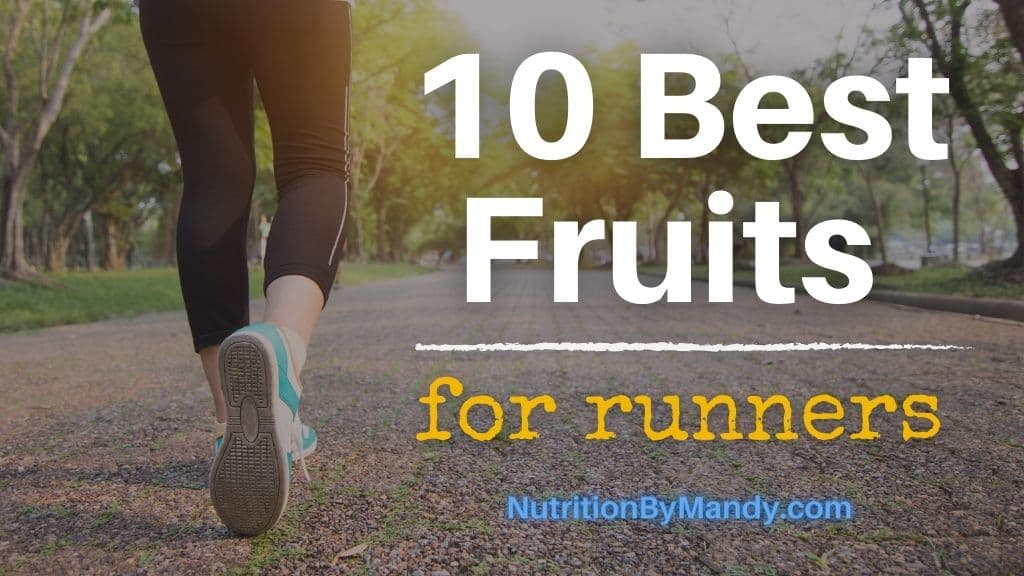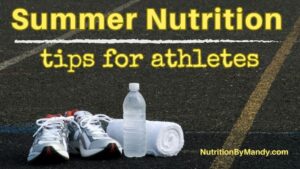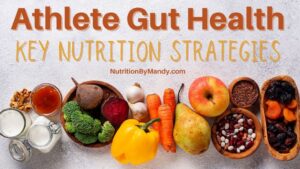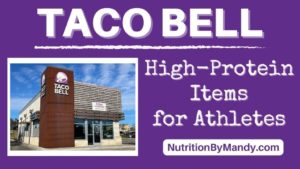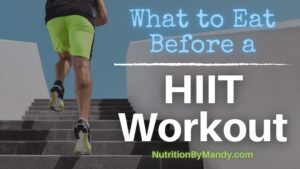Last Updated on March 22, 2025 by Mandy Tyler, M.Ed., RD, CSSD, LD
10 Best Fruits for Runners
Have you ever wondered what the best fruits for runners are to support their sports nutrition needs?
Let’s take a look at my top 10 recommendations of fruits that runners can add to their meal plans.
Best Fruits for Runners
Fruit is a healthy addition to the diet of runners. It provides carbohydrates, fiber, and an array of vitamins, minerals, and phytochemicals.
Different varieties of fruit contain different nutrients. Thus, runners should aim to include a variety of types of fruit in their sports nutrition diet.
10 Best Fruits for Runners
#1 Bananas: Best High-Carb Fruit for Runners
Bananas are a nutritious, high-carb fruit that runners can enjoy with meals and snacks. One large banana provides ~31 grams of carbohydrates, 3.5 grams of fiber, and contains a variety of vitamins, minerals, and antioxidants (1).
Bananas contain the electrolyte potassium. Potassium is necessary for muscle contraction, nerve transmission, and normal cell function. In addition, potassium helps the body with maintaining fluid balance (2), which is important for runners.
Bananas for Runners
Runners can grab a banana to eat for a quick high-carb snack prior to a morning run. Following a run, consider adding sliced banana to a peanut butter sandwich. This can be a great post-run snack, which supports runners with meeting their recovery nutrition needs.
Pro Tip: Sliced, frozen bananas also make a nutritious addition to a fruit smoothie. I feel bananas are the secret ingredient to making a smoothie creamy and delicious.

#2 Tart Cherries: Best Fruit for Runners Following a Workout
Tart cherries are a healthy fruit option for runners. They contain fiber, Vitamin C, potassium, calcium, and iron (3). Cherries also contain antioxidants and phytochemicals, which have anti-inflammatory effects in the body (4).
Aside from these nutrients, cherries provide a natural, dietary source of melatonin. In particular, Montmorency tart cherries are noted for their high melatonin content (5).
Therefore, consuming tart cherry juice has been researched as a natural way to support sleep quality and duration in athletes (6).
Tart cherry juice has also been found to help reduce muscle soreness and decrease inflammation following exercise. Thus, it may help promote a faster recovery from exercise (4), which can be advantageous for runners.
Pro Tip: Runners can consider adding tart cherries to their post-workout smoothie or enjoying tart cherry juice as a recovery drink following a run.
#3 Blueberries: Antioxidant-Rich Fruit for Runners
Blueberries are an excellent fruit choice for runners. They are recognized as being one of the fruits with the highest antioxidant capacities (7).
Blueberries provide a variety of nutrients, including: fiber, Vitamins A, C, and K, as well as potassium, magnesium, and phosphorus (8, 9).
Blueberries also have a high-water content (8), which can help support a runner’s hydration needs.
Based upon their high antioxidant content, blueberries have been associated with numerous health benefits. In particular, the phenolic compounds in blueberries have been associated with a positive anti-inflammatory effect in the body (7).
Pro Tip: Runners can enjoy blueberries as part of a high-carb breakfast before a run. Blueberries can be mixed into overnight oats, added to a fruit and yogurt parfait, or used as an ingredient in a healthy fruit smoothie.

#4 Oranges: Citrus Fruit for Runners
Oranges are a nutritious citrus fruit and great addition to a runner’s meal plan. They provide fiber, vitamins, minerals, antioxidants, flavonoids, as well as carotenoids (10). In addition, oranges provide an excellent source of Vitamin C.
A medium orange contains ~65 calories, 16 grams of carbohydrates, 3 grams of fiber (11). Oranges also have a high-water content; thus, they can help runners meet their hydration needs.
Vitamin C-Rich Fruit for Runners
In one medium-sized orange there is 70 mg of Vitamin C, which is > 75% of the daily value for Vitamin C (12).
Vitamin C is a water-soluble vitamin that has many important roles in the body. It is involved in protein metabolism, supports a healthy immune system, and helps to enhance the absorption of iron from plant sources (12).
In addition, Vitamin C is necessary for the formation of collagen in connective tissue, is involved in wound healing, and serves as an antioxidant in the body (12, 13).
Pro Tip: Runners can pack an orange to eat as part of a healthy lunch or enjoy orange slices with their post-workout snack.
#5 Kiwi: Nutrient-Dense Fruit for Runners
Kiwis are a nutrient-dense fruit runners can enjoy with meals and snacks. They are packed full of vitamins, minerals, and phytochemicals. Kiwis contain the Vitamins A, C, E, and K, as well as fiber, potassium, and copper (14).
Similar to oranges, kiwis are a great way for runners to add Vitamin C to their diet. A medium kiwi provides 56 mg of Vitamin C (14), which is more than 50% of the recommended daily value for adults.
One of the health benefits associated with kiwi consumption is improved sleep. Kiwis contain serotonin, as well as folate and antioxidants, which together may promote improved sleep in athletes (15).
Pro Tip: Consider enjoying kiwis as part of a fruit salad, as a fruit topping on Greek yogurt, or blended into a tropical smoothie.
#6 Watermelon: Hydrating Fruit for Runners
Watermelon is a great fruit for runners to add to their sports nutrition meal plan. Not only does watermelon provide vitamins, minerals, and antioxidants, it also has a high-water content. Thus, it can support runners with meeting their daily hydration needs.
Watermelons are ~90% water, thus the are a great hydrating fruit option. In addition, they are a natural source of the electrolyte potassium, Vitamins A and C, as well as the antioxidant lycopene (16).
Pro Tip: Runners can consider enjoying sliced fresh watermelon with their post-run meal or as part of an afternoon snack.

#7 Apples: Convenient Fruit Option for Runners
Apples are a healthy fruit option for runners. A medium Gala apple provides ~98 calories, 24 grams of carbohydrates, and 4 grams of fiber (17). In addition, apples contain phytochemicals which have anti-inflammatory effects in the body (18).
Apples are the perfect, portable snack that runners can be easily toss into their gym bag on the way out the door. Apples slices with nut butter can also be a great well-balanced snack for runners to enjoy.
Applesauce: Great Pre-Run Snack for Runners
In addition to apples, applesauce can be a good choice for runners. Runners can enjoy applesauce as a quick, high-carb snack prior to a run.
Applesauce is easy to digest and will provide runners with a quick source of energy for the upcoming run.
Applesauce squeeze pouches are a convenient, portable option for runners. They typically provide ~15 grams of carbohydrates per pouch (depending on the brand).
Pro Tip: Runners can consider keeping applesauce pouches on hand in their gym bags for a quick snack before a run.
#8 Pomegranates: Healthy Fruit for Runners
Pomegranates are a nutritious fruit that runners can incorporate into their meals and snacks. They are packed full of antioxidants and polyphenols, which exert anti-inflammatory effects in the body (19).
A medium (4”) pomegranate provides ~234 calories, 52 grams of carbohydrates, and 11 grams of fiber. Pomegranates also provide a variety of vitamins and minerals including Vitamin C, Vitamin K, folate, potassium, and magnesium (20).
Pro Tip: Runners can enjoy pomegranate seeds as a fruit topping for cottage cheese, mixed into a smoothie bowl, or added to a salad.
#9 Dates: Nutritious Fruit for Runners
Dates are a nutritious way for runners to add carbohydrates, fiber, vitamins, and minerals to their meal plan. They contain an array of phytochemicals, which have antioxidant effects in the body (21).
For runners, dates provide a convenient source of condensed carbohydrates as well as a good source of fiber. Consuming 2 pitted, Medjool dates provides ~133 calories and 3 grams of fiber (22).
The Natural Delights® website has a variety of recipes available featuring Medjool dates. In addition, you can try out their customized recipe builder for preparing energy balls or smoothies using dates.
Pro Tip: Medjool dates can be a convenient way to add natural sweetness to a smoothie. They can also be used as an ingredient in making energy balls or bars to enjoy as a healthy snack.

#10 Avocados: Nutrient-Rich Fruit for Runners
Finally, the avocado is a nutrient-rich fruit runners can enjoy to add healthy fats, fiber, vitamins and minerals to their meal plan.
Although many individuals typically think of avocados as a vegetable, they are botanically categorized as a fruit (23). One medium avocado (201 g) contains ~322 calories, 30 grams of fat, and 14 grams of fiber (24).
The majority of fat found in avocados is monounsaturated fat, a type of healthy, unsaturated fat (24). When eaten in moderation, monounsaturated fats are a healthy addition to an athlete’s meal plan.
Pro Tip: Runners can enjoy sliced avocado on a bagel as part of their post-run breakfast. Avocado can also be blended it into a high-calorie smoothie to increase the nutrient content of the drink.
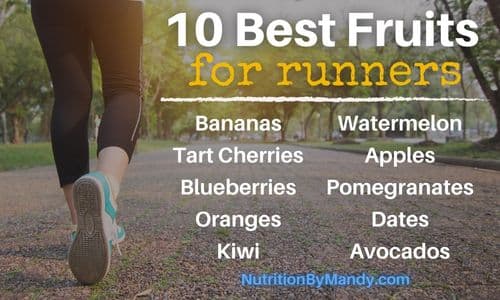
10 Best Fruits for Runners
You are now set with an idea for 10 fruits runners can incorporate into their diet to support their sports nutrition needs.
For additional sports nutrition tips for runners, check out my blog with ideas for what to eat before a morning run.
Join the Nutrition By Mandy Email List & Get a Free Athlete’s Grocery List
Click HERE to join the Nutrition By Mandy e-mail list. When you join you will receive a free athlete’s grocery list to print and take with you to the store.
About the Author
Mandy Tyler is a Sports Dietitian Nutritionist in the San Antonio, TX area. She is a Registered and Licensed Dietitian, a Board-Certified Specialist in Sports Dietetics, a Licensed Athletic Trainer, and is a Certified Exercise Physiologist through the American College of Sports Medicine. Mandy has experience working with athletes at the high school, collegiate, and professional levels. She believes the key to reaching one’s full potential, both in everyday life and in sports performance, relies on a healthy nutritional foundation.

